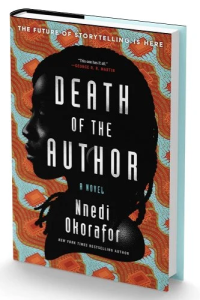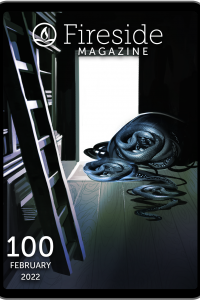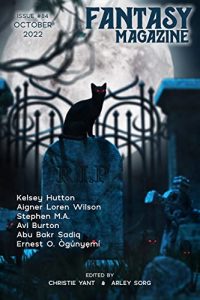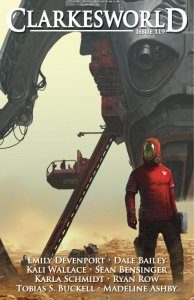Death of the Author by Nnedi Okorafor: Review by Gary K. Wolfe
 Death of the Author, Nnedi Okorafor (Morrow 978-0-06-344578-9, $30.00, 448pp, hc) January 2025.
Death of the Author, Nnedi Okorafor (Morrow 978-0-06-344578-9, $30.00, 448pp, hc) January 2025.
For a certain generation of academics, ‘‘the death of the author’’ is the title of an influential 1967 essay by Roland Barthes arguing against interpreting literature in terms of the author’s identity or psychology. Nnedi Okorafor’s Death of the Author makes a brief and oblique reference to this in an early chapter in which the protagonist, Zelu Onyenezi-Oyedele, an adjunct professor teaching a creative writing class, has the phrase thrown back at her by a surly student, but the phrase eventually takes on a number of additional meanings, one of which only becomes clear only as an ingenious metafictional twist very late in the novel. Perhaps the most important of these meanings, though, is that it may serve as a caution for readers to avoid the temptation of resorting to easy autobiographical readings of what has been widely publicized as Okorafor’s first mainstream novel (though there’s a fair bit of SF in it), and one that may seem to invite comparisons to other recent novels about novelists such as R.F. Kuang’s Yellowface or Percival Everett’s Erasure (the source of the film American Fiction). Certainly, readers familiar with Okorafor’s career or her TED talk and book Broken Places & Outer Spaces can spot a few parallels: Zelu is also an American-born daughter of Nigerian immigrants living in the Chicago area; she also has a complicated relationship with Nigeria itself and family she visits there; she teaches creative writing in a university and becomes a successful SF writer; and her painful recovery from a childhood accident that left her paraplegic is so convincingly described that it may reflect the author’s own experience with scoliosis, mobility, and balance issues.
But so what? Zelu is entirely her own character, often impulsive and not always sympathetic, and her issues with family, identity, and fame are her own as well – which is especially significant, since negotiating the hazards of family life and cultural heritage is one of the major engines of the plot, and the most compelling. We first meet Zelu at her sister’s wedding in Tobago, where her celebratory mood is dashed by the double whammy of discovering that she’s been fired from her adjunct teaching job and that her ambitious literary novel – she mentions she’d once wanted to write like Jamaica Kincaid – has been rejected by just about every publisher. In frustration, she begins work on a posthuman SF epic called Rusted Robots, which eventually becomes an unlikely fever-dream of both literary and commercial success: a massive bestseller which gains mainstream literary awards and leads to multimillion-dollar deals, including a blockbuster movie, instantly making Zelu into an international celebrity. It even leads to an invitation to travel into space from a multibillionaire industrialist who sounds like a benign Elon Musk, if such a thing is even imaginable anymore. But the pitfalls of literary celebrity soon follow: She hates the movie for whitewashing her African setting and character names; she’s taunted by an ambush interviewer into making statements that get her cancelled in a social media pile-on; she faces impatience from agents and editors, and even abuse from fans, when the sequel doesn’t show up as soon as they’d like (almost certainly reflecting the experience of Okorafor’s friend George R.R. Martin). And through all this she has to navigate the emotional turbulence of a family that seems skeptical of almost everything she accomplishes, including new robotic prostheses that will finally enable her to walk. Even her most trusted friend and lover, a tech entrepreneur from South Africa, is ambivalent.
Although the main action of the novel is set in a very lightly SFnal near future – Waymo-like autonomous vehicles ferry Zelu around Chicago; those new prostheses amount to a sophisticated, computer-mediated exoskeleton – we also get substantial excerpts from the novel-within-a-novel Rusted Robots, which revisits the pretty venerable SF theme of robots trying to figure out what extinct humans were like and what their own purpose might now be (some fairly famous stories by Lester del Rey, Isaac Asimov, and Brian W. Aldiss come to mind). In fact, those excerpts, narrated by an inquisitive robot named Ankara, amount to more than a fifth of Death of the Author. It’s always risky to actually show us a novel once you’ve described it as a massively popular, universally praised masterpiece, and indeed it’s a bit hard to swallow the notion that a story with almost no human characters (the last human shows up only briefly), describing an incipient war between humanoid robots called Humes and the disembodied Ghosts, could become that big a sensation (but then, Avatar?). Nor is there much explanation of any prior interest in SF that leads Zelu to try her hand at it. But Ankara’s narrative provides a valuable counterpoint to Zelu’s, reflecting the importance not only of building family or family-like relationships, but of the role of storytelling in defining who and what we are.
For a writer whose reputation has been built largely on the startling fertility of her imagination, Okorafor demonstrates an impressive capacity for the mundane as well. Any number of writers I know have had to deal with parents and siblings for whom even the greatest successes can be greeted as disappointments or questionable decisions. At a family gathering, ‘‘Everyone was talking about the latest drama at Tolu’s law firm or the football game Chinyere’s twelve-year-old son, Emeka, was playing in. She was having amazing experiences, but no one in her family wanted to hear about them.’’ Two of the novel’s most memorable sequences are the death of Zelu’s father and an ill-advised decision to visit the father’s native village in Nigeria despite security concerns (which leads to the novel’s most harrowing action sequence). Both highlight the challenges not only of negotiating high-achieving families (Zelu’s older sister is a chief of surgery, her brother a successful lawyer, her father’s siblings all have terminal degrees, and her mother insists they are all Yoruba royalty), but of navigating the dual identities of Nigerian Americans, or Naijamericans – a theme which Okorafor has explored before, notably in her Akata Witch series of novels. In the best of Okorafor’s earlier work, the epic imagination which helped earn her reputation was grounded by unsentimental insight into the complexities and conflicts of characters faced with uninvited challenges and opportunities, and with Death of the Author those complexities prove just as challenging in our own world. While the result probably isn’t what many Okorafor readers were expecting, it may be one of her most revealing, deeply felt, and insightful novels to date.
Interested in this title? Your purchase through the links below brings us a small amount of affiliate income and helps us keep doing all the reviews you love to read!
Gary K. Wolfe is Emeritus Professor of Humanities at Roosevelt University and a reviewer for Locus magazine since 1991. His reviews have been collected in Soundings (BSFA Award 2006; Hugo nominee), Bearings (Hugo nominee 2011), and Sightings (2011), and his Evaporating Genres: Essays on Fantastic Literature (Wesleyan) received the Locus Award in 2012. Earlier books include The Known and the Unknown: The Iconography of Science Fiction (Eaton Award, 1981), Harlan Ellison: The Edge of Forever (with Ellen Weil, 2002), and David Lindsay (1982). For the Library of America, he edited American Science Fiction: Nine Classic Novels of the 1950s in 2012, and a similar set for the 1960s. He has received the Pilgrim Award from the Science Fiction Research Association, the Distinguished Scholarship Award from the International Association for the Fantastic in the Arts, and a Special World Fantasy Award for criticism. His 24-lecture series How Great Science Fiction Works appeared from The Great Courses in 2016. He has received six Hugo nominations, two for his reviews collections and four for The Coode Street Podcast, which he has co-hosted with Jonathan Strahan for more than 300 episodes. He lives in Chicago.
This review and more like it in the December 2024 issue of Locus.
 While you are here, please take a moment to support Locus with a one-time or recurring donation. We rely on reader donations to keep the magazine and site going, and would like to keep the site paywall free, but WE NEED YOUR FINANCIAL SUPPORT to continue quality coverage of the science fiction and fantasy field.
While you are here, please take a moment to support Locus with a one-time or recurring donation. We rely on reader donations to keep the magazine and site going, and would like to keep the site paywall free, but WE NEED YOUR FINANCIAL SUPPORT to continue quality coverage of the science fiction and fantasy field.
©Locus Magazine. Copyrighted material may not be republished without permission of LSFF.









